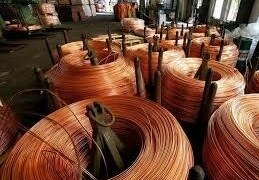 © Reuters. Imported coal is seen lifted by cranes from a coal cargo ship at a port in Lianyungang, Jiangsu
© Reuters. Imported coal is seen lifted by cranes from a coal cargo ship at a port in Lianyungang, JiangsuBy Meng Meng and Josephine Mason
BEIJING (Reuters) – Some Chinese coal traders handling U.S. imports have begun sourcing future supplies domestically, people with knowledge of the matter said, as they await delivery of the last U.S. cargoes to arrive before hefty tariffs kick in on Thursday in a deepening trade row between the world’s top two economies.
At least six cargoes of U.S. coal were due to arrive this month, Thomson Reuters Eikon shipping data showed, but at least three were still en route or waiting off ports to unload cargo on Wednesday.
From Thursday, the United States will impose new tariffs on $16 billion of goods and in retaliation, Beijing has pledged additional tariffs on a similar amount of U.S. imports including metals, fuel – and coal.
Shanghai Runhei International, a major domestic coal trading house, cleared its last U.S. metallurgical coal cargo at Qinhuangdao port earlier this week, a senior manager with the trading house said. He declined to be named because he was not authorized to speak to the media.
“We have completely stopped U.S. metallurgical coal (imports), which is popular among steel mills, in late July. There is too much uncertainty in trade,” he said.
The cargos due for August arrival were mainly booked in May after Beijing first threatened to hit coal with heavy tariffs and Chinese buyers were able to scoop up volumes at bargain prices, according to the manager.
Shanghai Runhei said it will increase purchases of domestic coking coal instead of foreign supplies to meet demand from clients – a policy that is set to gain traction.
“Unless U.S. coal producers give us a big bargain, Chinese buyers will not import U.S. coal,” said Huang Zhiqi, a coal trading consultant at Falcon Information.
EASY TO SHIFT
China’s appetite for U.S. coal grew this year as traders looked for alternative supplies after Australian coal prices hit six-year highs in July.
“Traders have anticipated yuan depreciation and shored up imports in advance, including cargoes from the United States,” Wang Fei, coal analyst at Huaan Futures said. “Traders can easily shift their supplies to either domestic coal or Australian and Indonesian coal since U.S. imports only count for a tiny share.”
Some Chinese buyers were also hoping to use the trade war as a bargaining chip to get even cheaper U.S. supplies.
State-owned utility Guangdong Yudean Group asked U.S. coal miners to give a discount on prices after the trade dispute escalated, but was denied, a source with direct knowledge of the conversation said. The person declined to be identified because he was not authorized to speak to media.
Guangdong Yudean Group was not available for comment.
China’s domestic metallurgical coal market remained tight in August amid a continuing environmental crackdown in the major producing region Shanxi province.
Coking coal futures prices were up 12 percent since the start of July to 1,334 yuan ($194.06) on Wednesday.
Fusion Media or anyone involved with Fusion Media will not accept any liability for loss or damage as a result of reliance on the information including data, quotes, charts and buy/sell signals contained within this website. Please be fully informed regarding the risks and costs associated with trading the financial markets, it is one of the riskiest investment forms possible.
Source: Investing.com




























